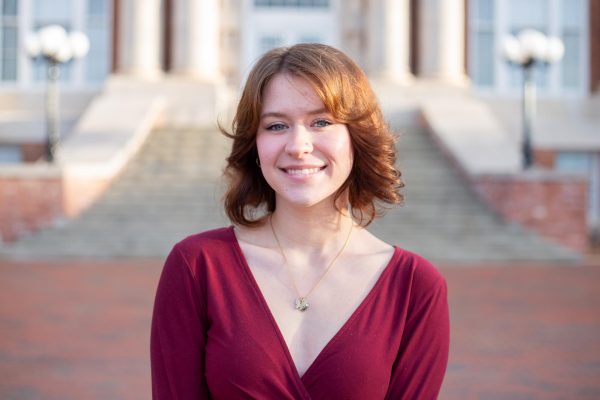The moon began its crawl across the sun in Mazatlán, Mexico around noon on Monday. After a rainstorm obstructed the solar eclipse for Starkville residents, students, professors and families filed into the Bost Extension Center Theater at Mississippi State University to watch NASA’s livestream of the eclipse.
The solar eclipse watch party was hosted by the MSU Department of Physics and Astronomy, the College of Arts & Sciences and the Office of Research and Economic Development. Viewers entered the theater clad in rain-soaked clothing to watch with eager eyes. Minutes ticked by, and chatter of anticipation rose in the growing audience.
As the eclipse neared totality, a diamond ring took shape in the sky. Remaining bits of sunlight peeked through the moon’s mountains and canyons, forming bright beads of light around the moon’s shadow. Seconds later, darkness engulfed the theater. Viewers watched as rays of sunlight banded the moon, fiery pink flecks radiating around the its shadow.
Rumblings of excitement erupted in the theater as viewers pointed, cheered and clapped. The small frame of a young girl leaped from her seat toward the screen. This was the first total eclipse visible from North America since 2017 and will be the last until 2045.
Donna Pierce, an astronomer in MSU’s Department of Physics & Astronomy, spoke on the significance of the eclipse.
“Solar eclipses for any individual spot on Earth don’t happen very often. There are spots on Earth that can go a thousand years or more between eclipse events,” Pierce said. “Now the fact that we had the last total eclipse event for the United States in 2017 just happened to be a wonderful thing for us. But given again that the next one isn’t going to happen for the Starkville area until 2045, we wanted to take any opportunity that we could to share with people what an amazing event an eclipse can be.”
NASA’s livestream followed the eclipse along its path of totality from its beginning in Mazatlán, Mexico, to its exit from continental North America off the Atlantic coast of Newfoundland, Canada.
Starkville’s downpour ceased as the eclipse approached Kerrville, Texas. Viewers filed outside the theater in hopes of catching a glimpse of the eclipse through the clouds.
Nine-year-old Aurilla Morgan stood hunched in a bright pink raincoat with one eye fixed through a miniature telescope pointed at the grey sky.
Morgan expressed her disappointment with Starkville’s cloudy view of the eclipse.
“I think it was okay, but I was kind of disappointed that the clouds were kind of blocking it out. I was hoping to try and film it,” Morgan said, gesturing to her National Geographic telescope.
Luckily, NASA’s livestream offered Morgan a chance to see her first solar eclipse.
“I think it was a really good experience. My favorite part of the eclipse is when it fully blocks, so you can see the little ring,” Morgan said, posing her hands together to create a circle. “It looks like a widening eyeball.”
Morgan said that although the solar eclipse in 2017 happened during her lifetime, Monday’s eclipse was the first she could remember.
“I think it was a really good experience,” Morgan said. “Some people travel to other places like Mexico to get a more clear view, so you just be lucky if you had enough time to go there.”
Like Morgan, this was the first eclipse that senior English major Anya Moyer had experienced through her own eyes.
“Even if I couldn’t see the full eclipse, if I could just see something, that would be incredible,” Moyer said. “This actually is the first eclipse I’ve seen. I hope it’s not the last.”
Moyer is determined to attend the next total eclipse in 2045.
“I’m gonna do all I can to see it, like full eclipse in person, no clouds,” Moyer said. “I don’t care how far I’ve gotta go, I’m gonna see it.”
A large crowd of viewers huddled in the parking lot, laughing and cheering while wearing eclipse glasses. Watching them from underneath an awning, Pierce described astronomy’s ability to captivate an audience.
“Astronomy is one of those sciences that has the power to capture people’s imagination,” Pierce said. “Particularly when you see people during an eclipse and all of the wonderful jubilations that they exclaim, it makes you stop and pause about our place in the universe.”







